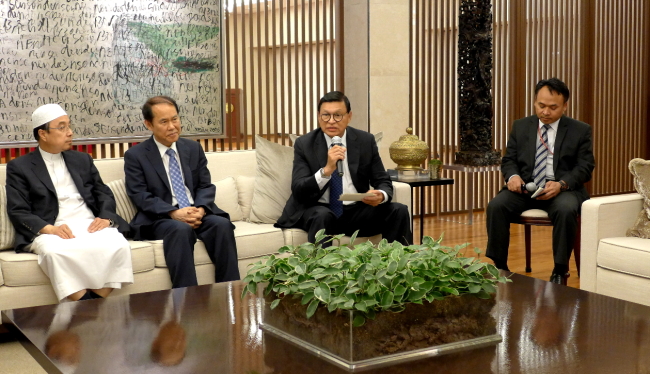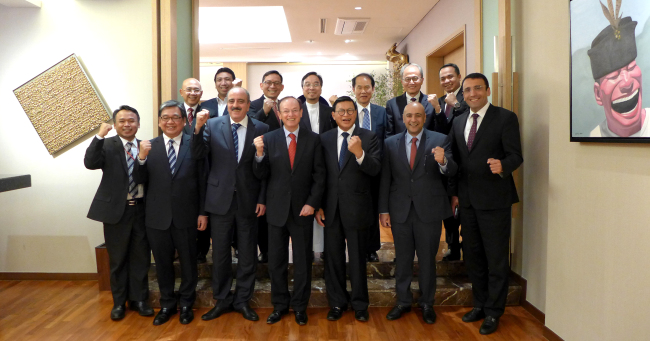Indonesian Ambassador John Prasetio on Thursday held an iftar -- a meal ceremony to mark the end of the daily Ramadan fast at sunset -- joined by several Muslim ambassadors.
The event at the Indonesian Embassy in Seoul included Islamic prayers, a speech and dinner, acting as a point of convergence for the believers.
Moroccan Ambassador Mohammed Chraibi, Kuwaiti Ambassador Jasem Albudaiwi, Tunisian Ambassador Mohamed Ali Nafti, Azeri Ambassador Ramzi Teymurov and Bruneian Ambassador Dato Paduka Haji Mohd Rosli Bin Hj Sabtu participated, along with Imam Abdul Rahman Lee Ju-hwa, president of the Korea Muslim Federation Choi Young-kil, ASEAN-Korea Forest Cooperation Secretariat executive director Hadi Pasaribu and Bank Negara Indonesia Seoul general manager Wan Andi Aryadi.
 |
Indonesian Ambassador John Prasetio (second from right) speaks at the embassy to mark the end of Ramadan before the "Iftar" dinner, joined by Muslim ambassadors and practitioners. (Joel Lee/The Korea Herald) |
“Ramadan is one of the most important months of the Islamic calendar, where family, friends and communities come together to strengthen bonds of friendship and unity,” Prasetio said in a speech. “It is the month to celebrate the spirit of forgiveness, and the time to exercise will power, patience and forbearance over the tests and hardships of a month-long fasting.”
Noting that Islam is the main religion of Indonesia, which has 255 million people, the envoy said his country has the largest Muslim population in the world.
There are also millions of practitioners of other faiths, he added, saying people of different religions join to celebrate solidarity, rapport and support for one another.
Mentioning he arrived at Korea over three years ago, Prasetio remarked that Koreans are tolerant and respectful of foreign religions, although the Muslim community is small here and locals have not been greatly exposed to it. Korean local governments have provided support for Indonesian Muslim communities, he said.
“Indonesia is keen on promoting a positive branding of Islam as a religion of peace, mercy, tolerance, moderation and understanding,” he said. “We actively join the efforts of other Muslim majority nations to combat radical views of minority groups that have fueled violence, bigotry, exclusion and extremism.”
 |
Muslim ambassadors, diplomats and businessmen pose at the Indonesian embassy for the iftar dinner hosted by Indonesian Ambassador John Prasetio (Joel Lee / The Korea Herald) |
Indonesia’s national emblem -- horizontally bifurcated in red and white -- symbolizes “unity in diversity,” according to the diplomat. “Late American boxing legend Mohammed Ali said being a Muslim had given him success as well as peace. Islam means ‘peace’ and Muslim means ‘one who surrenders to God.’”
The iftar is one of main observances of Ramadan and is often celebrated as a community. Muslims believe that feeding others iftar is a form of charity that was practiced by the founder of Islam, the Prophet Muhammad.
In Indonesia, markets sell various foods for iftar, including Middle Eastern dates and other traditional food and drinks. After the meals and prayers, which are usually done at home, people go to the mosque for more prayers and sermons.
By Joel Lee (
joel@heraldcorp.com)









![[Today’s K-pop] Blackpink’s Jennie, Lisa invited to Coachella as solo acts](http://res.heraldm.com/phpwas/restmb_idxmake.php?idx=644&simg=/content/image/2024/11/21/20241121050099_0.jpg)